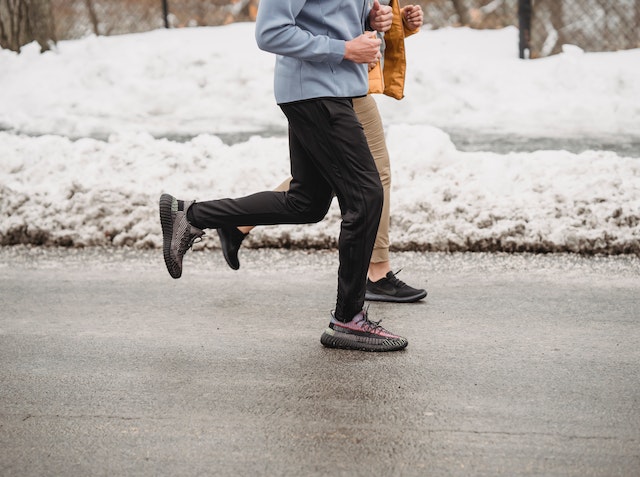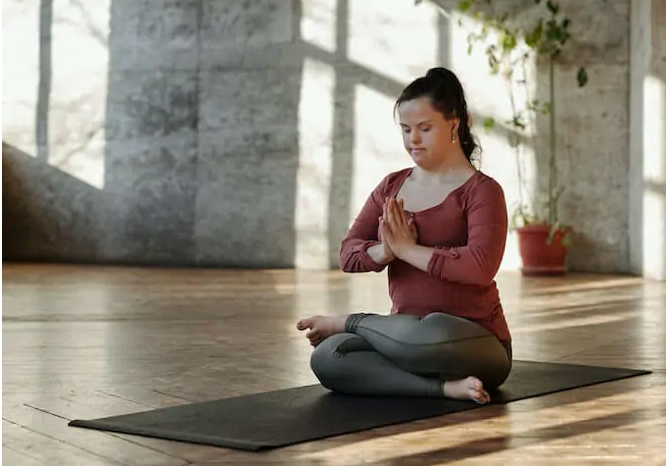This is fantastic. In reality, no matter whether you’re a veteran of yoga or a squinting weight room novice, there aren’t many things more beneficial than exercising.
We don’t have to inform you that exercising regularly makes you healthier, fitter, and more content. You already are aware of that. What you might not be aware of is the positive effect that incorporating it into your daily routine has on your sleeping.
From the power walk to push-ups or squats, regular exercise helps you get a good night’s sleep. (And provides you with an uplifting feeling of achievement.)
To start the year off on the right foot (literally) we’ve examined the benefits of snooze-tastic working out in order to answer the following question:
How does exercise improve sleep?

How Exercise Helps Sleep
It’s the most truthful of statements isn’t it? The more you work out more you exercise, the better your sleep. While this is (mostly) true however, the connection between sleep and exercise is much more complex than it appears.
In other words, don’t think that you will see immediate outcomes. Like everything worth doing exercise to improve sleep will take time to provide the full benefits. It is essential to do the effort.
Indeed, one study in 2013 conducted a study that tested resistance and regular workout participants and found that, even after two months of sleep, it had not improved.
It was until it happened.
If the same group of people were tested again, just four weeks after, the results revealed that they had gotten as much as 1.25 hours of more sleep each night. This is not even counting the increase in quality sleep that was spotted by the people who were tested.
In reality, the effect of exercise on sleep is a gradual than a quick hits. Once you’ve begun working out, the benefits increase in the coming days.
Exercise, for example, helps regulate the rhythm of your circadian (your body clock that you have built in) aiding your brain in understanding when it’s time to slow down.
You see, our brains love routine. Therefore, if you exercise at (roughly) same time every day the brain will automatically develop its sleep/wake cycle according to this pattern. You’ll drift off into a natural sleep pattern, which will improve the quality of your sleep.
And that’s not even the best part. Oh, no. In fact, sticking to a routine of exercise could reduce the risk of developing diabetes, known to be a sleep disruptor.
However, the benefits aren’t only physical. Exercise has been shown to reduce symptoms of depression and anxiety and both of these can significantly affect your sleep.
Exercise as a Sleep Disruptor
It’s a minor side-track here however, we’d be remiss to not take it up.
Although exercise can improve overall quality of sleep and length however, there’s a catch and it has to relate to the amount of pressure you put in your sit-ups. Exercise boosts your core temperature and also increases the level of adrenaline your body produces. This is a good thing. You’re looking for that.
If these surges occur at night you’re likely to find that your exercise will result in the opposite result, causing your body to pump up while you try to relax which makes it more difficult to fall asleep.
The secret? Well-timed workouts. Ideally, not more than three hours before the time of bed.
This allows your body to feel the adrenaline-inducing rush of an exercise session, and reap the benefits of a good night’s sleep, and be able to unwind before going to the bed.
Which is the Best Exercise for Sleep?
Thus, we’ve discovered that sleep and exercise are inextricably connected. We’ve also noted that it’s crucial to think about the time of your exercise. We’ve even discussed the science behind it.
In reality, the only thing we’ve not done is give you some tips about the best exercises to sleep, which is the sweaty, grunty goodness that gets the endorphins flowing and encourages a peaceful sleep.
Naturally, any exercise you perform will benefit. You don’t need to work out like you’re auditioning to be Ninja Warrior, but it’s worth noting that different forms of exercise have various benefits, and it’s helpful to comprehend the impact they have on your body and mind and how they affect your quality of sleep.
Aerobics
Aerobic training (cardiovascular exercise If you’re looking for a fancy) concentrates on the heart pumping. This is the type of exercise for which”getting your sweaty’ was originally coined to refer to.
Typically, this includes swimming, running and cycling, skipping as well as walking. Aerobic exercise fills the bloodstream of oxygen, providing immense health benefits, ranging from a lower risk of heart disease to preventing strokes.
It’s great for sleep.
When you get your heart rate to a higher level, you accumulate a so-called “sleep debt’. It basically means that your body is in need of sleep to heal from the exertion.
But there’s more than that.
A variety of studies have proven that aerobic exercise regularly can help alleviate the symptoms of insomnia as well as reduce the effects of certain conditions like frequent sleep issues like sleep apnoea.
It doesn’t matter if you’re doing a few steps in the pool, an intense cycling session or just walking around the block, making time for cardio will greatly increase your odds of sleeping better.

Resistance
Dumbbells. Kettle bells. Powerbands. Barbells, if you’re brave.
Resistance training, also known as weight training broadly is any exercise that requires you to pull or lift. Hence, resistance. It could also comprise isometric exercises like sits-ups or push-ups.
A popular choice for anyone looking to build fitness, tone their bodies or simply push themselves to a harder exercise, resistance training can bring advantages for your physical and mental wellbeing.
For instance the regular exercise of weights strengthens muscles, improves posture and has been shown to lower cholesterol, reduce blood pressure as well as even prevent weight increase.
Some experts suggest the benefits of resistance exercise over aerobic exercise in getting a better night’s sleep. While the jury is split regarding this issue, there’s the consensus that resistance training improves sleep.
How? It boils down to fatigue after a workout and the body’s natural process of recovery.
When you push your body using cables, weights, or crunches, you may damage your muscles, which requires rest in order to repair them. This is why you feel… tired following a workout. This is why you want the protein fix.
Furthermore, resistance training stimulates an increase in a chemical called adenosine which induces sleep by inhibiting neural activity, causing drowsiness.

Yoga
It’s true that yoga is technically a method exercise that focuses on resistance. But due to its particular advantages, we wanted to investigate it in more in depth.
For those who aren’t familiar it is a form of exercise that blends resistance training with meditation, and. It’s as much a workout to your brain as your body is, which makes it a potent sleep-ally.
The practice is derived from an old Hindu practice It is widely regarded as the ideal blend of mindfulness and exercise. It can be suggested by doctors to treat anything from anxiety to high blood pressure.
If you regularly practice yoga, it can help you improve your flexibility, boost the energy level of your body, as well as assist you to keep your weight in check. Yoga can also alleviate any physical discomfort that you might be experiencing.

An 2012 study discovered five-quarters of those who practice yoga noticed improvement in how much and quality of sleep they get. This included up to 83% of them reporting reduced stress levels, another sleep-related issue that is common.
Despite its reputation as a difficult discipline however, there are a number of basic yoga poses that are suitable for those who are new to yoga. The challenge is to commit to regular routine. Yoga isn’t a quick fix. But the more you work on your skills, the better rewards you will receive from sleep.
Exercise and sleep are intrinsically linked. And they hugely influence each other. The more you exercise, the better you sleep. The better you sleep, the more likely you are to exercise.
So, whether you’re getting a few steps in or committing to a crunch, or simply incorporating a bit of gentle yoga into your sleep routine the response to “does exercise aid sleep is a clear yes.

